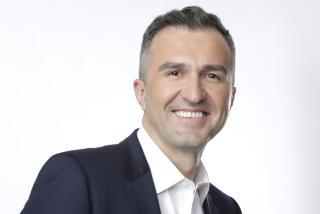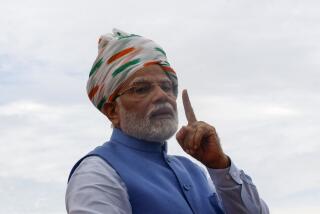Russia’s New NTV Boss Seeks to Calm Journalists
- Share via
MOSCOW — The new chairman of Russia’s only independent TV network faced down angry journalists Thursday, dismissing their fears that he might undermine media freedom and insisting that his only goal is to turn a profit.
“You can’t charge a person with a crime that he hasn’t yet committed,” said Alfred Kokh, who orchestrated the hostile takeover of Russia’s combative NTV network earlier this week. “We haven’t quashed freedom of speech, and we don’t plan to do so.”
Kokh, who heads the media subsidiary of the state-run natural gas monopoly Gazprom, decided not to call in the police to press his claim of control over the network. Instead, he showed up at the NTV offices without aides or security.
Following a testy two-hour meeting, Kokh and the journalists agreed to form a reconciliation commission whose decisions would be binding. The commission will have 20 members, 10 from each side.
“I am not satisfied but at least it is some kind of a decision,” Kokh said.
The outcome suggests that the NTV dispute has shifted from a fight over ownership of shares to a conflict over editorial leadership. It also suggests that Kokh and Gazprom-Media may agree to reconsider a vote this week to replace the network’s general director, Yevgeny Kiselyov, with U.S. financier Boris Jordan, who is considered favorable to the Kremlin.
Journalists said that without Kiselyov, the network’s integrity will be compromised. NTV is the only major voice of dissent on Russia’s national television airwaves.
“They won’t tell us that they are introducing censorship or something,” said Marianna Maximovskaya, an NTV reporter. “They will just tell us: ‘Oh, the situation in Chechnya is getting better now, and there is no need to spend money on trips there.’ Or they will say: ‘Refugees? No, this situation has been resolved. We can’t afford to spend money on doing this refugees story again.’ That is exactly how they will choke us.”
“I don’t really believe this reconciliation commission will achieve any serious result,” said Svetlana Sorokina, a news anchor. “The problem is that we don’t have common ground at all, not on any issue.”
More to Read
Sign up for Essential California
The most important California stories and recommendations in your inbox every morning.
You may occasionally receive promotional content from the Los Angeles Times.













